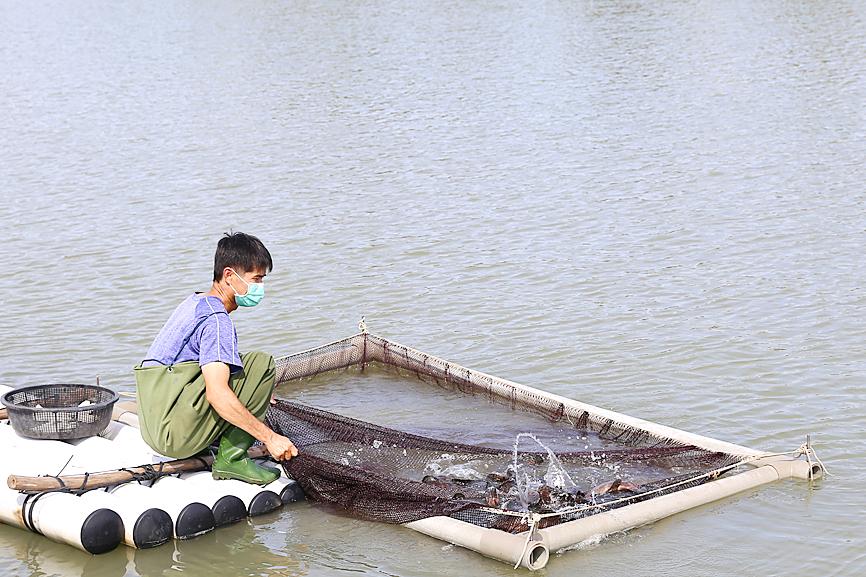Taiwan is tackling a ban on its grouper exports to China by increasing its funding for school lunches so that students can have at least one fish meal per month, the Ministry of Education said yesterday.
A ministry proposal to hike its school lunch funding by NT$600 million (US$20.07 million) was approved earlier in the day by the Cabinet, and the money is to be allocated from the budget for this fiscal year, Minister of Education Pan Wen-chung (潘文忠) said.
The funds would be disbursed to help provide at least one meal per month containing local grouper at elementary and junior-high schools nationwide until the end of the year, Pan said.

Photo: CNA
Not all students currently have access to the highly nutritional grouper, and that was one of the reasons why the ministry put forth the proposal to fund the inclusion of the fish in school lunches, he said.
The ministry was also motivated to include the fish on the school lunch menu after Chinese authorities on June 13 imposed a ban on grouper imports from Taiwan due to alleged excessive residues of the antibiotic oxytetracycline and prohibited chemicals, Pan said.
It is “regrettable” that Taiwan’s high-quality produce and seafood are being subjected to “undue political pressure,” Pan said, joining the pushback by other Taiwanese officials, who have said China’s decision was politically motivated and a breach of international trade rules.
The increased funding for school lunches will benefit the students, as well as fish farmers who have been affected by China’s grouper ban, Cabinet spokesman Lo Ping-cheng (羅秉成) said.
The Directorate-General of Budget, Accounting and Statistics has already allocated the additional NT$600 million approved by the Cabinet for the increased cost of school lunches, Lo said.
The ministry in May increased its subsidies for the inclusion of local produce in school lunches, from NT$6 per meal to NT$10 in urban areas, and to NT$14 in remote areas, ministry data showed.
In the first five months of this year, 92.75 percent of schools in remote areas were covered by the subsidy program, a sharp increase from 56.45 percent in 2020, ministry statistics showed.

Prosecutors in New Taipei City yesterday indicted 31 individuals affiliated with the Chinese Nationalist Party (KMT) for allegedly forging thousands of signatures in recall campaigns targeting three Democratic Progressive Party (DPP) lawmakers. The indictments stem from investigations launched earlier this year after DPP lawmakers Su Chiao-hui (蘇巧慧) and Lee Kuen-cheng (李坤城) filed criminal complaints accusing campaign organizers of submitting false signatures in recall petitions against them. According to the New Taipei District Prosecutors Office, a total of 2,566 forged recall proposal forms in the initial proposer petition were found during the probe. Among those

ECHOVIRUS 11: The rate of enterovirus infections in northern Taiwan increased last week, with a four-year-old girl developing acute flaccid paralysis, the CDC said Two imported cases of chikungunya fever were reported last week, raising the total this year to 13 cases — the most for the same period in 18 years, the Centers for Disease Control (CDC) said yesterday. The two cases were a Taiwanese and a foreign national who both arrived from Indonesia, CDC Epidemic Intelligence Center Deputy Director Lee Chia-lin (李佳琳) said. The 13 cases reported this year are the most for the same period since chikungunya was added to the list of notifiable communicable diseases in October 2007, she said, adding that all the cases this year were imported, including 11 from

China might accelerate its strategic actions toward Taiwan, the South China Sea and across the first island chain, after the US officially entered a military conflict with Iran, as Beijing would perceive Washington as incapable of fighting a two-front war, a military expert said yesterday. The US’ ongoing conflict with Iran is not merely an act of retaliation or a “delaying tactic,” but a strategic military campaign aimed at dismantling Tehran’s nuclear capabilities and reshaping the regional order in the Middle East, said National Defense University distinguished adjunct lecturer Holmes Liao (廖宏祥), former McDonnell Douglas Aerospace representative in Taiwan. If

The Mainland Affairs Council (MAC) today condemned the Chinese Communist Party (CCP) after the Czech officials confirmed that Chinese agents had surveilled Vice President Hsiao Bi-khim (蕭美琴) during her visit to Prague in March last year. Czech Military Intelligence director Petr Bartovsky yesterday said that Chinese operatives had attempted to create the conditions to carry out a demonstrative incident involving Hsiao, going as far as to plan a collision with her car. Hsiao was vice president-elect at the time. The MAC said that it has requested an explanation and demanded a public apology from Beijing. The CCP has repeatedly ignored the desires